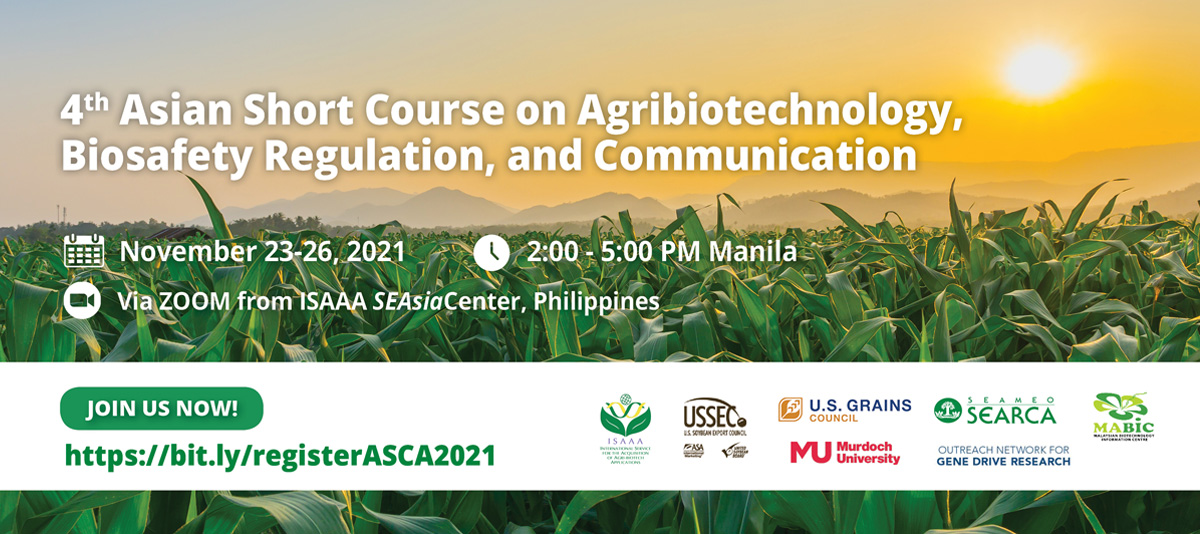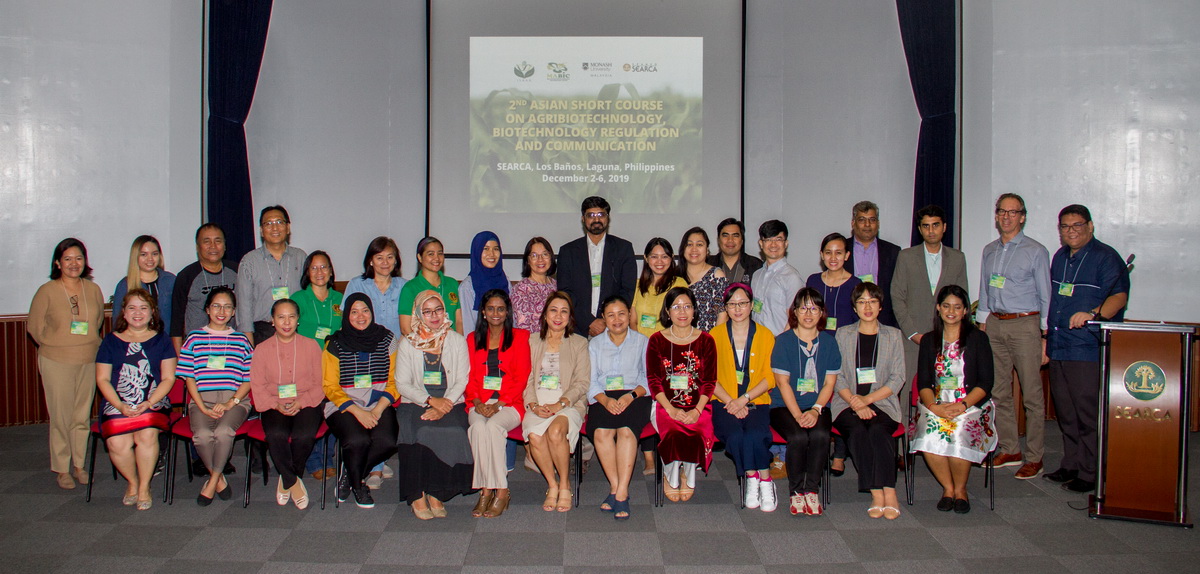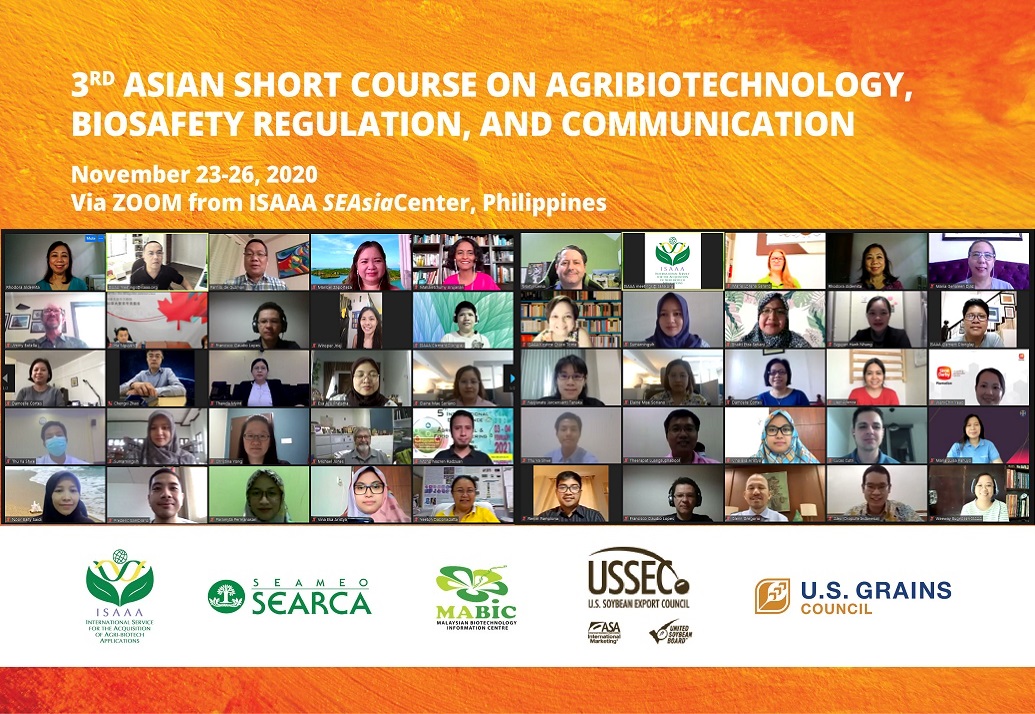ISAAA Hosts 4th Asian Short Course on Agribiotechnology, Biosafety Regulation, and Communication (ASCA)
| |
ISAAA SEAsiaCenter hosts the fourth Asian Short Course on Agribiotechnology, Biosafety Regulation, and Communication (ASCA) on November 23-26, 2021. The four-day course will be conducted at 2:00-5:00 PM Manila time (GMT+8) via Zoom.

ASCA is a training-workshop course aimed at capturing audiences who are interested to learn about the entire value chain related to research, development, commercialization, and trade of living modified organisms (LMOs); national and international legal instruments related to LMOs; effective communication of agribiotechnology and biosafety regulation; communicating agribiotechnology on social media; and science diplomacy in international negotiations.
The first ASCA was held in Malaysia in 2018 led by Dr. Mahaletchumy Arujanan, ISAAA Global Coordinator and Executive Director of the Malaysian Biotechnology Information Center (MABIC). It was a platform created to enhance the capacity building of Asian policymakers and regulators in modern agribiotechnology.
The second ASCA was co-organized by MABIC, ISAAA, and the Southeast Asian Regional Center for Graduate Study and Research in Agriculture (SEARCA), in December 2019 in the Philippines and gathered 25 participants from both public and private sectors from eight countries, including China, Indonesia, Malaysia, Pakistan, the Philippines, Taiwan, Thailand, and Vietnam. The first and second short courses included lectures, practical lab exercises, and field trips designed for the participants to gain first-hand knowledge about the process of developing biotechnology products.

The third ASCA held in November 2020 was conducted via Zoom and gathered 43 participants from 12 different countries from North America, South America, and Asia. It was done online as a response to the ongoing COVID-19 pandemic which limited international travel among the participants, resources persons, and organizers.

For the fourth ASCA, international experts will serve as resource persons. Participants will get conceptual first-hand information from scientists on the development of biotech (genetic modification and genome editing) crops and animals (from the lab to the market). The course will provide lectures, discussions, and exercises on environmental and food/feed safety assessment of biotech products. The role of modern biotechnology in agriculture, its benefits and impact on trade and the economy will also be discussed, as well as strategic communication methods in quad media, including risk communication. Lastly, participants will also receive training in communicating science through social media and the basics of science diplomacy and its use in international negotiations. There will be six sessions for ASCA 2021 including the following:
- Modern Biotechnology: Genetic Engineering and Gene Editing
- Sharing of Biotechnology Status in Asia
- Road to Commercialization of Public Sector Biotech Crops
- New Technologies: Science and Potentials
- Economic and Market Impact
- Science Communication and Science Diplomacy
The fourth ASCA is co-organized with the US Soybean Export Council, US Grains Council, Murdoch University, SEARCA, Outreach Network for Gene Drive Research, and MABIC.
The participants' fees of US$150 include exclusive access to workshop, print and online training kits (bios, abstracts, PPT presentations, related references, video recording of proceedings, and copies of videos used in the workshop. ISAAA accepts payments through Paypal. For other payment modes, please contact ISAAA.
To see ASCA 2021's list of resource persons, the scope of the course, and other details, download the ASCA 2021 flyer. The registration is now open at bit.ly/registerASCA2021.
Related articles:
- ISAAA Conducts 3rd ASCA for Capacity Enhancement of International Scientists, Regulators, Beneficiaries
- Asian Course Tackles Importance of Integrating Research, Effective Communication and Science-based Regulation in Agribiotech
| Newer Post | Archive | Older Post |
Science Speaks is ISAAA Inc.'s official blog. Weekly blog articles, authored by ISAAA writers, partners, and invited contributors, aim to help share, disseminate, and promote scientific knowledge and its vital role in achieving global agricultural sustainability and development. Your support to Science Speaks will help us achieve this goal. You can help us by donating as little as $10.

